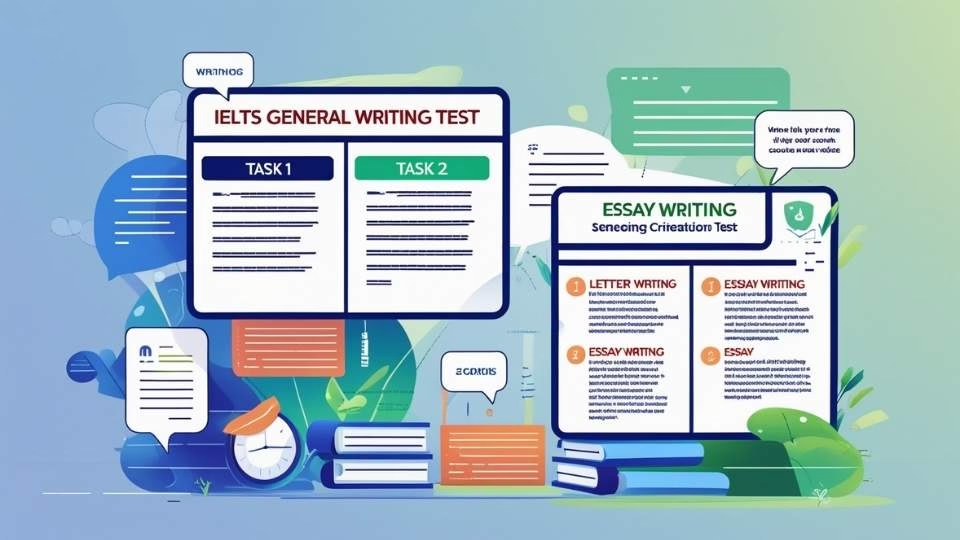How To Score 7 Plus In IELTS General Writing, Here is how a candidate prepares for scoring 7 plus in IELTS General Writing Tips to meet their IELTS score requirements. Securing a passing mark in the IELTS examination appears difficult but it is entirely within reach if the appropriate steps are taken. Based on my experience, things will fall into place with adequate practice and proper planning. There is no need to be stressed at the outset.
It’s important to learn the format of the exam, the dos and don’ts, and how to practice properly to be able to grade well. In this essay, I am going to outline some uncomplicated methods which readers can practically implement in their lives to improve their results. Let’s get on with it; shall we?
Key Takeaways
- Familiar yourself with the IELTS General Writing test format and the way it is internally assessed.
- Do not lose focus on precision, fluency, as well as grammatical and lexical skills.
- Be sensible with the time taken to prepare Task 1 in comparison with Task 2.
- Get into a habit of regular practicing while keeping in touch with people who are acquainted with the subject matter.
- Do not go astray such as writing irrelevant things or failing to comprehend the task expectations.
Breaking Down the IELTS General Writing Test
General Writing includes the following tasks:
Task 1: Letter Writing
Word Requirement: Minimum of 150.
Types of Letters:
- Formal: e.g. engineering students writing to their departmental heads or other office instructors.
- Semi-Formal: e.g. Engineering students writing to their Tutors or neighbors.
- Informal: e.g. writing to one’s children or other family members.
Purpose: The letter will ask you to:
- Respond to an inquiry.
- File a complaint.
- Provide expertise or consultancy.
- Give thanks or tender an apology.
Task 2: Essay Writing
Word Requirement: At least 250 words.
Types of Essays:
- Opinion Essays: You provide and justify your opinion on a topical issue.
- Discussion Essays: You state both sides of the argument.
- Problem-Solution Essays: Determine the issue and provide the solution.
- Advantage-Disadvantage Essays: Weighs pros and cons of a situation.
Purpose: Evaluate your ability to structure and develop an argument clearly and cohesively.
Scoring Criteria
Objective: Structure and formulate an argument clearly and in a coherent manner.
- Task Achievement/Response: Understanding of the how well you attended to the issue.
- Coherence and Cohesion: Your ideas make sense.
- Lexical Resource: Your vocabulary range and accuracy.
- Grammatical Range and Accuracy: Your sentence structures and grammar.
My Proven Strategies How To Score 7 Plus In IELTS General Writing
Mastering Task 1: Letter Writing
Let us tackle the first task, which is writing a letter. It is imperative that you comprehend the tone, format, and purpose of every letter type individually.
Know the Letter Types
Every type of letter varies: formal, semi-formal, and informal. Each necessitates a distinct tone and style. For example,
- Formal Letter: A letter that is friendly but very professional and polite. Such phrases include “I am writing to inform you… or I would appreciate it if”
- Semi-Formal Letter: Friendly but with a touch of respect. Appropriate phrases include “I would like to discuss…” or “It would be great if you could…”
- Informal Letter: It is personal and conversational. Such phrases include “It’s been so long since…” or “How have you been?”
Structure Your Letter
Stick to a clear structure:
Greeting: Commence with either, “Dear [Name],” or “Dear Sir/Madam,” depending on who the letter is addressed to.
Opening Paragraph: Provide reasons as to why you are writing the letter.
Body Paragraphs: Elaborate on every bullet point given (these can be 2-3 paragraphs long).
Closing Paragraph: Restate the goals, or provide an action statement.
Sign-off: For informal letters write, “Best wishes,” and for formal letters use, “Yours sincerely.”
Avoid Common Pitfalls
- Discuss all bullet points as mentioned in the question.
- Make sure the tone is the same throughout the letter.
- Plus of minus words does not fulfil the requirement.
2. Excelling in Task 2: Essay Writing
Because task 2 carries a higher weighting, it affects your writing score more, which means more effort needs to go into it. Here is what I did:
Understand the Essay Types
- Opinion Essays: Construct a strong argument in the first paragraph and support it throughout the paper.
- Discussion Essays: Talk about the issue from both sides and give your own opinions about it.
- Problem Solution Essays: Focus on describing thoroughly the problem outlined in the task and suggesting ways to improve it.
- Advantage Disadvantage Essays: Analyze and argue the both sides of the topic.
Plan Before Writing
Spend around 5 minutes to:
- Read through the question and highlight important points.
- Come up with ideas and arrange them in order of importance from the highest to the lowest.
- Write down the structure of your essay in the following manner; Introduction, Body(2-3 paragraphs) and Conclusion.
Use Cohesive Devices
Use these in place of or alongside more advanced vocabulary:
- Addition: “In addition, Moreover, Additionally…”
- Contrast: “Nonetheless, Conversely, Even so…”
- Example: “To demonstrate, To illustrate…”
- Conclusion: “To conclude, To sum up…”
Focus on Grammar and Vocabulary
- Mix Sentence Structure
- Avoid repetitive vocabulary by using synonyms.
- Check for common errors like verb tense agreement and punctuation mistakes.
How I Practiced Effectively
1. Take Mock Tests
In my case, taking a mock test structured the way the real one is structured helped me focus on the exam itself as well as use the time efficiently. I have been following the same pattern on all my previous mocks, where I give myself 20 minutes to write the first task and then move on to the second one for 40 minutes.
I hate paced myself properly with the timed tests. To get the details correct, I stuck to the official IELTS mock material such as the IELTS Cambridge series books. After completing the test, I analyzed my writing to perform to ensure high self standards in grammar, lexicon, and coherence.
2. Seek Feedback
I found it incredibly useful to receive feedback to catch errors and improve my ability. With the help of a professional IELTS instructor, I received feedback on my writing with suggestions pertaining to task response, task coverage, and grammar.
This was also the case with the various IELTS forums where writers and test performers posted their work for others to discuss. I learned a lot from other people. Each piece of feedback I was provided with was put into practice during my future work sessions where I tried tackling issues such as sentence structure and vocabulary problems.
3. Use Online Tools
My crafting skills improved, thanks to online resources which complimented my practice. Grammarly enabled me to catch grammatical errors and effectively repair sentence structures. The Hemingway App helped make sentences and phrases more readable by indicating intricate sentence structures. The IELTS website was another source I visited for sample answers and more practice exercises.
4. Track Progress
Measuring progress aided my ability to determine growth at a later stage. I kept a logbook, where every essay and letter I completed was saved. Each of these documents was categorized by the task type, the topic of the writing, and the feedback I received.
Regular inspection of these documents revealed patterns such as grammar errors and phrases I relied heavily on. Tackling these issues would gradually enhance my performance.
Common Mistakes to Avoid
1. Misinterpreting the Question
Arguably, the most common issue is the interpretation of the task and following instructions. This can lead to off topic responses as well as partial responses. In the IELTS Writing section, these sub-tasks are further broken down into instructions that need to be completed with bullet points.
Not being able to complete the question due to misunderstanding or lack of information will negatively impact on your Task Achievement score since the question is still addressed.
How to avoid it:
- Spend a few minutes scanning the question and highlighting important parts such as the classification of the letter (either formal or informal) or the essay (opinion or discussion).
- Focus on the aim of the writing task first. For instance, if writing a letter and you are supposed to give advice, ensure your content and language reflects bits and pieces of advice.
- Try to answer the overall questions in pieces as well as one by one.
2. Overcomplicating Sentences
A majority of candidates tend to think that long complex sentences are required to convince the examiners. Although as nice as it sounds, too much complexity may lead to a lot of mistakes and misunderstandings as well as difficulty articulating the ideas.
In the IELTS Writing test however, while it’s important to add details, one also needs to ensure that coherence is exceeded. Overly complicated sentences can pose a lot of problems for the examiner thus lowering your Coherence and Cohesion score.
How to avoid it:
- Strive to construct sentences that are direct and to the point. Rather than writing “The issue that has been discussed at length by numerous scholars pertains to the increasing environmental concerns in urban areas,” try “A lot of professors talk about increasing environmental issues in cities.”
- Remember to firmly cross all the boxes established for every task you mix simple, compound and complex sentences to add variety.
- Always choose accuracy. A simple correct sentence will always be more useful than a poorly rendered compound sentence.
3. Ignoring the Word Count
Most people are bad at estimating how long the passage should or will written and to some extent it bring consequence. Additionally, writing in excess does not bring terrible results but it is easy to get lost in unnecessary details. It also can lead to wasting time and unused space which is bad.
Writing in Excess or Writing to Reach a Word Count goal is a slack attempt at ‘Task Achievement’ because it is unreliable. Not meeting the word count goal can portray incomplete thoughts which can be equally harmful while exceeding the goal with too much can also run a risk of time constraints.
How to avoid it:
- In Task 1, you should easily be able to hit 160-180 words and in Task 2, 270-290. These ranges give a buffer that allows you to remain in cover while still reaching requirements.
- Make it a goal to draft under 160 – 180 words for the first one and 270 – 290 words for the second one. The con is that you have to keep an eye on time and word count.
- Complete the given tasks efficiently and with focus on clarity and details. Remember, it is quality work that you are aiming to achieve and not quantity.
4. Lack of Planning
You will all agree that the greatest blunders stem from inadequate arrangement of thoughts and concepts. Planning is pivotal because, without it, the sequence of your ideas will be off and you may skip crucial components.
The examiners look at the way the thoughts have been crafted and how they inter relate. Often, poor planning will lead to repetition and paragraphs that were meant to be connected being disconnected.
How to avoid it:
- Always remember to plan: Before you begin writing, take 3 to 5 minutes to frame your response. For the first task, determine the key areas you will address in the letter. As for the second, jot down the main arguments plus the examples to be discussed.
- Write it down: Have an outline so it is easy to phrase your thoughts. For instance, your essay has an introduction, two or three body paragraphs, and a conclusion.
- Stick to your outline when writing so you will flow side by side with time.
5. Neglecting Grammar and Vocabulary
According to once truism, avoiding word and grammatical errors can predictably get you marked down. For instance, one must remember the importance of proper grammar and use of English vocabulary when preparing for the IELTS Writing band descriptors.
Why it matters:
Some grammar mistakes like using the wrong verb tense, or forgetting to include a subject can significantly diminish the article’s readability. Similarly, a short vocabulary range will dull your writing and create a repetitive tone.
How to avoid it:
- Grammar: Take time to learn grammar rules and practice self-corrections. Use online programs such as Grammarly to catch errors in subject and verb agreement, punctuation, and sentence structure.
- Vocabulary: Create a collection of words and phrases for a specific topic. For instance, when preparing for the environment, learn terms such as “sustainability”, “pollution,” and “conservation” among others.
- Use paraphrasing to avoid unnecessary redundancy. For instance, instead of focusing on the word “important,” one could use “essential,” “crucial,” or “vital.”
- Increase your volume of writing and switch gears to focus on getting guidance from a tutor on how to improve grammar and vocabulary.
Tips for Test Day
- Stay Calm: Overthinking distorts the mind. Try to take some deep breaths before beginning.
- Manage Time: Do not exceed the time limits given. Task 1 – 20 minutes; Task 2 – 40 minutes.
- Proofread: Try listening to the aversive text of the topic or questions and answer for the last five minutes.
- Stay On-Topic: Make sure that your answer does not deviate from the question given.
- Write Clearly: Avoid untidy and unplanned notations which could make your answer unclear.
My Opinion
Moving from an 8 to a 7 Plus band in IELTS general writing is only possible through a shift in focus from practicing a lot to practicing rightly. Study the structure of the test, make sure that it is presented logically with proper sequencing, and strengthen your grammar and vocabulary consistently. Strategies presented here will help you to get through the test without any fear.
Don’t forget that effort is what is most important, and when you decide to make that effort and structure your plan correctly, you are well on your way.










Leave a Reply